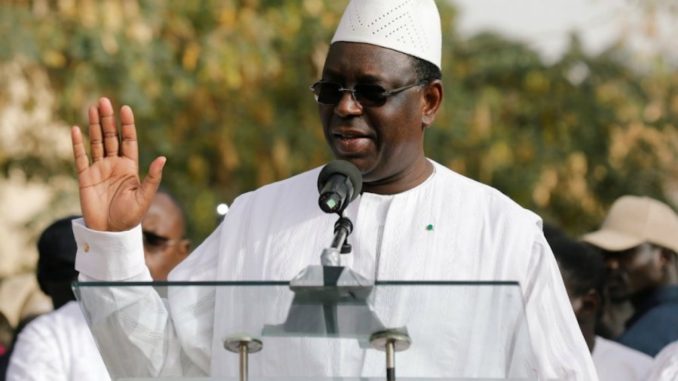
…Sall won a second term in office on the back of a remarkable economic record. The Sengalese economy grew from about 5 per cent in 2012, when he first took office, to 7 percent in 2017, the most recent year for which actual data is available.
Macky Sall, the president of Senegal, is perhaps still basking in the euphoria of his re-election win. Sall won 58 per cent of the presidential vote held on February 24. Second-place winner, Idrissa Seck, garnered 21 per cent of votes cast, while Ousmane Sonko, the third-place winner, secured 16 per cent. In any case, it was not much of a contest.
Potentially stronger contenders were not on the ballot. Karim Wade, son of former President Abdoulaye Wade, and Khalifa Sall, the former mayor of Dakar, were barred from running, owing to convictions for corruption.
The opposition did not take it totally lying down per se. In early February, the senior Wade, who was Senegal’s president for twelve years, returned home from France, where he lives, to speak his mind in person. He called for a largely unsuccessful boycott of the polls.
Incidentally, in four of the twelve years of Wade’s rule, Sall was prime minister. And Sall would later go on to be his nemesis in the 2012 presidential election.
Naturally, some argue that the series of events leading to the disqualification of Wade’s son and the incumbent’s namesake, Sall, were politically motivated. They are probably right.
Mark Bohlund of Bloomberg Economics in London argued ahead of the February polls that “a new system that involves sponsorship of presidential candidates and validation by the Constitutional Court…prompted accusations of a limiting factor for political competition being created that tarnishes Senegal’s strong democratic record.”
Such was the convincing grip of President Sall on Senegalese politics ahead of the February polls that Bloomberg Economics’ Bohlund reckoned early on that “attempts at constitutional changes allowing (Sall) to contest a third term (could not) be ruled out.”
Economic Boom Amid Rising Debt
Still, Sall won a second term in office on the back of a remarkable economic record. The Sengalese economy grew from about 5 per cent in 2012, when he first took office, to 7 percent in 2017, the most recent year for which actual data is available.
Economic projections by the International Monetary Fund (IMF) suggest the economy would likely maintain this momentum for another half a decade to 2023, with oil and gas production in 2022 expected to lift real GDP growth to the double-digits in the last two years.
Bloomberg Economics’ Bohlund worries about Senegal’s rising debt, however. “The sharp rise in Senegal’s debt in recent years has been described as an example of the ‘pre-resource’ curse in which governments borrow heavily now to reap the benefits of revenue streams coming online in the future. Reducing Senegal’s indebtedness will be a key focus in the coming years.”
That said, Bohlund highlights that “the Senegalese government has pledged to close the budget deficit by raising its tax revenue towards the West African Economic and Monetary Union (WAEMU) criteria of 20 per cent of GDP.”
“If successful, this would support Senegal’s status as one of the few African countries being upgraded by credit rating agencies – Standard and Poor’s retained its positive outlook on Sengal’s B+ rating in December.”
Policy Continuity
With Sall now re-elected, Adeline Van Houtte, the Africa Analyst at The Economist Intelligence Unit in London, spoke about the country’s outlook under his leadership for another five years.
“Macky Sall, the president, has been re-elected for a second term, and is now well placed to implement the second phase of his economic development strategy.”
“Like many other African heads of state, Mr. Sall was able to benefit from incumbency advantages but also his strong track record on economic and development issues, which laid the foundations for his decisive first round victory. However, the trial of the popular Khalifa Sall and his exclusion from the election race have left many voters disillusioned.”
“We expect the president to face a tough challenge to restore trust in governance, especially in the eyes of Senegal’s influential urban youth and the media, as well as restore a workable relationship with opposition politicians.”
“Encouraged by a strong economic performance (with real GDP growth averaging more than 6 per cent in 2014-18), and with new hydrocarbon developments set to bolster government revenues from 2021-22 onwards, the temptation will be to focus on the economy and allow governance reforms to slip down the agenda.”
“Mr. Sall will preside with a strong majority in parliament, which will facilitate policy making. The government has drawn up a list of priority actions required for the next phase of its Plan Sénégal Emergeant (PSE) development strategy, which was adopted in 2014.”
“Large foreign-funded infrastructure projects played a major role in phase one of the PSE, and phase two will also include rural infrastructure projects including the construction of 3,050 km of rural roads, the electrification of 675 villages.”
“But the second phase will also lay much greater stress on improving productivity, enhancing basic social services and reducing poverty. A donor meeting in December mobilised aid pledges of €13 billion (US$14.4 billion) – double the level of external assistance for the first phase of the PSE. France was particularly supportive, pledging €1.5 billion.”
“The re-election of Macky Sall will provide policy continuity in the country and policy will continue to be guided by the government’s PSE supporting strong economic activity.”
Rafiq Raji, a writer and researcher, is based in Lagos, Nigeria. Twitter: @DrRafiqRaji
An edited version was published in the April 2019 issue of New African magazine.
END

Be the first to comment